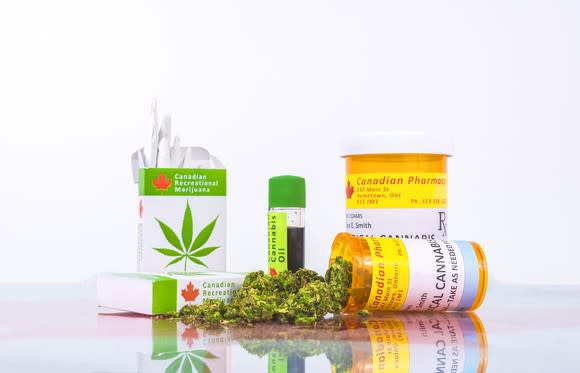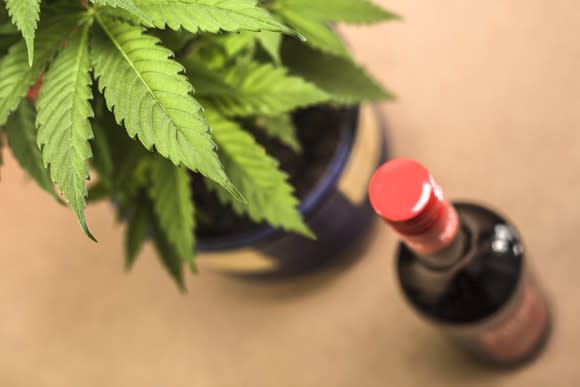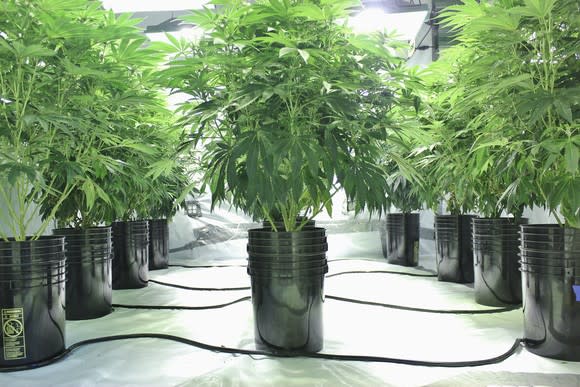5 Marijuana Growers That Offer Differentiation in an Otherwise Crowded Industry
In a little more than three weeks, Canada is set to make history by becoming the first industrialized country in the world to legalize recreational marijuana. This big step, which will occur on Oct. 17, should result in billions of dollars flowing into the legal Canadian weed industry, and perhaps make investors in marijuana stocks a pretty (green) penny.
But as we approach legalization, we're liable to see Wall Street and investors shift their attention in regard to how they evaluate pot stocks. Despite capacity expansion being all the rage during the first half of the year, Canadian growers are going to need to do a lot more than just grow a lot of weed in order to stand out. Wall Street and investors will be looking for unique, differentiating factors when considering marijuana stocks for investment going forward.
Though the cannabis space remains highly fluid, the following five growers each offers something unique that may be of interest to investors.

Image source: Getty Images.
Canopy Growth Corp.
Even though Aurora Cannabis is expected to lead the field in terms of peak production potential, it's Canopy Growth Corp. (NYSE: CGC), which is likely to be the No. 2 in terms of annual production, that offers true differentiation.
For starters, Canopy Growth has what might be the most scalable infrastructure in the entire cannabis industry. It offers the ability to sell its product online, as well as in physical stores, and it's expanded to nearly a dozen countries spanning five continents. To be clear, it certainly doesn't hurt that it's working on 5.6 million square feet of capacity (2.4 million of which has been licensed thus far), which should allow it to yield around 500,000 kilograms per year.
But more importantly, Canopy Growth arguably has the most recognizable brand throughout all of Canada: Tweed. Whereas most pot stocks are only now moving on to building their brand, Canopy Growth has been engaging consumers with its brands for years. That should go a long way toward helping Canopy attract a larger customer base once legalization becomes official in 23 days.
Image source: Getty Images.
Aphria
Ontario-based Aphria (NASDAQOTH: APHQF) will probably slot in as the No. 3 grower in terms of peak annual production behind Canopy Growth and Aurora Cannabis. However, it's not the company's 255,000 kilograms of production or its extensive international infrastructure, mostly acquired through its purchase of Nuuvera earlier this year, that stands out. Instead, it's the company's focus on alternative products.
On June 6, Aphria announced its intent to construct an extraction center in Leamington, Ontario, that'll produce about 25,000 kilograms of cannabis concentrates and fractionated distillates per year, once at full capacity. All told, construction of this facility will cost Aphria 55 million Canadian dollars ($42.6 million U.S.).
What makes this facility so important is that alternative cannabis products are expected to offer substantially higher margins, despite a smaller consumer pool, than dried cannabis. As we've witnessed from Colorado, Washington, Oregon, and even California within the first couple of months, oversupply tends to wreak havoc of the per-gram price of dried cannabis. These alternative products, such as concentrates and cannabis oils, generate much better margins and are far less likely to be commoditized.
However, investors should be aware that most alternative consumables won't be legal come Oct. 17. With the exception of dried cannabis and oils, other forms of consumption, such as vapes, concentrates, edibles, and infused beverages, won't be legal until Parliament amends the Cannabis Act (which is widely expected to happen next year).

Image source: Getty Images.
OrganiGram Holdings
Small-cap OrganiGram Holdings (NASDAQOTH: OGRMF) also stands out from a very crowded field of growers. To begin with, it's an Atlantic-based grower that's based in Moncton, New Brunswick. Typically, most growers are based in British Columbia, Ontario, or Quebec. That makes OrganiGram a bit of an afterthought for investors, but also makes it what I believe is the best "value" in the marijuana industry.
Secondly, OrganiGram leans heavily on its data-driven production model. In March, the company announced that substantially higher yields than expected would allow its peak production potential to hit 113,000 kilograms, up from a previous forecast of 65,000 kilograms.
Yet what's most interesting about OrganiGram is the company's use of its growing space. OrganiGram employs a three-tiered growing system, thereby maximizing the square footage of its 480,000-square-foot Moncton facility. Think about this for a moment: OrganiGram is expected to yield 113,000 kilograms from 480,000 square feet, whereas Pure Sunfarms -- a joint venture between Emerald Health Therapeutics and Village Farms International -- expects to produce just 75,000 kilograms from 1.1 million square feet of retrofitted grow space. Few growers offer the efficiency of OrganiGram, which may give it a genuine shot at the lowest per-gram growing costs in the industry.

Image source: Getty Images.
The Green Organic Dutchman
The Green Organic Dutchman (NASDAQOTH: TGODF), which was one of the largest pot-based initial public offerings ever earlier this year, is currently expected to be the fourth-largest producer when at peak capacity. Management has suggested that the company can deliver 195,000 kilograms per year. But it's not gross yield that allows The Green Organic Dutchman to stand out. Instead, it's the company's focus on alternative products.
Amid a flurry of press releases in June, TGOD, as the company is also known, announced that it was going to construct a 287,245-square-foot facility on its 72.4-acre Valleyfield property that would be devoted to beverage and edible production. TGOD's focus on cannabis-infused beverages is of particular interest given how eager beverage companies have been to spark their own growth by entering the marijuana space. In August, Molson Coors Brewing formed a joint venture with HEXO Corp., while Constellation Brands announced a $3.8 billion equity investment into Canopy Growth. It's clear that brand-name beverage companies have interest in partnering with the cannabis industry, and TGOD could be a logical partner with its foray into beverages.
As noted above, be aware that TGOD's beverage and edible production will be at the mercy of Parliament and its ability to expand what consumables are legal.

Image source: Getty Images.
CannTrust Holdings
Last but not least, don't overlook small-cap CannTrust Holdings (NASDAQOTH: CNTTF). CannTrust will likely work its way into a spot among Canada's top-10 growers, with management calling for "in excess of 100,000 kilograms" when at full capacity.
What makes CannTrust so unique is the manner in which CannTrust is growing its crop. The company's Niagara Greenhouse is focused on hydroponics, which is a method of growing plants in a nutrient-rich water solvent as opposed to soil. The Niagara facility also employs moving containerized benches that'll allow for perpetual harvesting. Comparatively, harvesting is typically very lumpy for most of CannTrust's competitors. This combination of utilizing hydroponics and moving containerized benches should lead to some of the lowest growing costs in the industry.
In the early going, CannTrust has also consistently been one of the most profitable pot stocks of the bunch, which may help it stand out. Understandably, a lot of this profitability has stemmed from how it recognizes the fair value of its biological assets, rather than genuine operational growth. Nevertheless, CannTrust is turning heads and could really stand out if it can remain significantly profitable on a per-share basis.
More From The Motley Fool
Sean Williams has no position in any of the stocks mentioned. The Motley Fool owns shares of Molson Coors Brewing. The Motley Fool has a disclosure policy.

